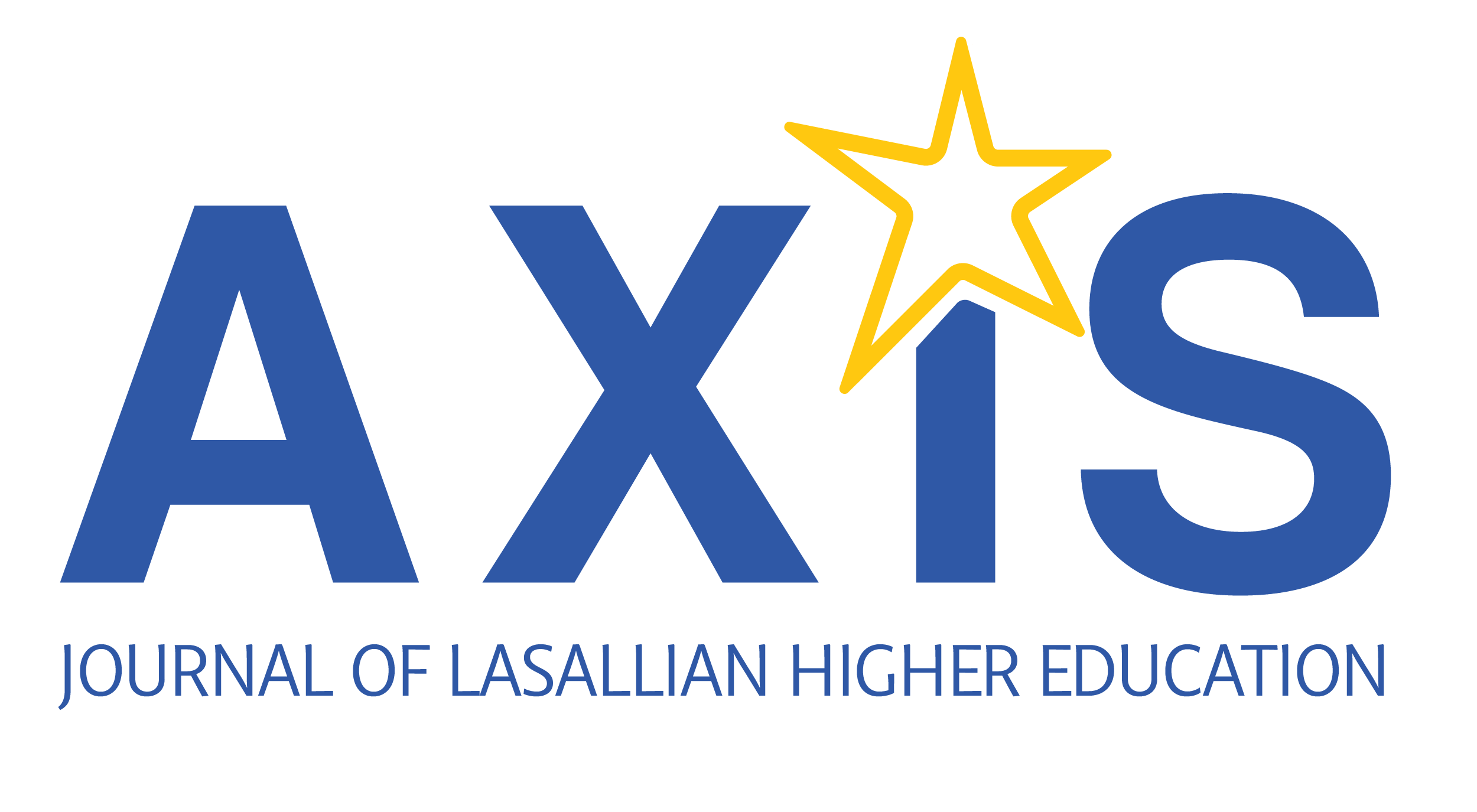AXIS: Journal of Lasallian Higher Education
Reviewer InformationReviewer Selection
The Editorial Board is committed to sustaining a diverse body of reviewers who collaborate with authors to disseminate new work, and also with the Editor to ensure that the published scholarly and creative works meet the highest standards of quality.
Qualified reviewers are solicited actively from among persons who possess credentials and records of successful participation in scholarly inquiry and dialogue within and about Lasallian Catholic higher education. Individuals are welcome to self-nominate by submitting an electronic CV / Resume to axis@cbconf.org, or to nominate others for consideration by email to the same address.
Reviewers are appointed by the Editorial Board. Qualifications include:
- An earned doctorate
- Recognized Lasallian competence or Catholic higher education competence, indicators of which might include but are not limited to:
- Teaching or policy-setting work in Catholic higher education
- Service on a Board of a Catholic university or college
- A record of sustained engagement in leadership at Buttimer Institute of Lasallian Studies, Huether Lasallian Conference,
Brother John Johnston Institute of Contemporary Lasallian Practice, the former Lasallian Leadership Institute, or International Association of Lasallian Universities Conferences - Recommendation of provincial leadership
- Production of documents, manuals or other works of recognized value in Lasallian or Catholic higher education
Review Process
Submissions to Sections I (Original Scholarly and Creative Works) and II (Shared Knowledge Archive) of AXIS: Journal of Lasallian Higher Education are peer-reviewed using a double-blind process (author and reviewer identities are not disclosed to each other). Reviewers are not compensated. Each submission is reviewed by at least two reviewers, one of whom is usually a member of the Editorial Board. Every effort is made to provide reviewers from institutions other than the author’s. Generally, reviewers are asked to consider no more than two articles per year.
Authors receive written confirmation of submission, and of the publication decision within about twelve months of submission. Reviews are recorded by logging into a registered account, accessing the assigned online review form, then entering ratings and comments. Ratings and comments are aggregated by a member of the editorial team and then forwarded to the author, with specific notice that the submission is accepted or declined for publication. With some minor variations to accommodate submission characteristics, review criteria are generally:
- theoretical or pedagogical value to Lasallian Catholic higher education
- grounding in existing scholarship vis a vis Lasallian Catholic higher education
- effective argumentation and support for conclusions offered
- sufficiently strong mechanics to indicate timely revision if necessary
- contributive value of any supplemental materials
Reviewer Responsibilities
Peer review is the principal mechanism by which the quality of scholarly and creative works are judged in the academic community. The quality of the peer-review process influences significantly the reputations of a journal, individual scholars, and fields of study. Peer Reviewers must exercise disciplinary expertise but also fair judgment, sensitivity and insight regarding their role in creating and advancing dialogue among scholars.
Subsequently, reviewers have identifiable responsibilities toward readers, authors and editors.
Reviewer responsibilities toward authors include:
- Maintaining the confidentiality of the review process: not sharing, discussing with third parties, or disclosing the information in the reviewed work
- Providing written, timely feedback about
- the degree to which the work is original, and framed in the context of the larger body of relevant work, likely to be of interest to AXIS readers
- the scholarly merits or mission-supporting value of the work, to include the documented basis for the reviewer’s opinion whether the product is clear, relevant, accurate and of value to Lasallian Catholic higher education
Peer reviewer responsibilities toward editors include:
- Alerting the editorial team about any potential personal or financial conflict of interest and declining to review when possibility of a conflict exists
- Determining scholarly or creative merit, originality, and scope of the work; indicating ways to improve it; and recommending acceptance or rejection using the assigned rating criteria and scales
- Notifying the editorial team immediately if unable to review in a timely manner
- Noting any ethical concerns, such as any violation of accepted norms of ethical treatment of animal or human participants, or substantial similarity between the reviewed manuscript and any other paper or manuscript with which the reviewer is familiar
- Providing a thoughtful, fair, constructive, and informative critique of the submitted work – a sound combination of rigor and collegiality
- Refraining from direct author contact until after a publication decision has been communicated to the author(s)
Peer reviewer responsibilities toward readers include:
- Ensuring that the submission cites all relevant work by other scholars
- Ensuring that the submission adheres to the journal’s standards
- Protecting readers from research that is incorrect, flawed, cannot be validated by others or impedes rather than advances dialogue regarding the mission of Lasallian Catholic higher education
Adapted from the Council of Science Editors “White Paper on Promoting Integrity in Scientific Journal Publications”. Downloaded 22 September 2009 from http://www.councilscienceeditors.org/editorial_policies/white_paper.cfm.

